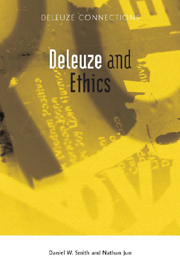Book contents
- Frontmatter
- Contents
- Acknowledgments
- Introduction
- 1 Whistle While You Work: Deleuze and the Spirit of Capitalism
- 2 The Ethics of the Event: Deleuze and Ethics without Aρχή
- 3 While Remaining on the Shore: Ethics in Deleuze's Encounter with Antonin Artaud
- 4 Responsive Becoming: Ethics between Deleuze and Feminism
- 5 Deleuze, Values, and Normativity
- 6 Ethics and the World without Others
- 7 Deleuze and the Question of Desire: Towards an Immanent Theory of Ethics
- 8 “Existing Not as a Subject But as a Work of Art”: The Task of Ethics or Aesthetics?
- 9 Deleuze, Ethics, Ethology, and Art
- 10 Never Too Late? On the Implications of Deleuze's Work on Death for a Deleuzian Moral Philosophy
- 11 Ethics between Particularity and Universality
- Notes on Contributors
- Index
5 - Deleuze, Values, and Normativity
Published online by Cambridge University Press: 12 September 2012
- Frontmatter
- Contents
- Acknowledgments
- Introduction
- 1 Whistle While You Work: Deleuze and the Spirit of Capitalism
- 2 The Ethics of the Event: Deleuze and Ethics without Aρχή
- 3 While Remaining on the Shore: Ethics in Deleuze's Encounter with Antonin Artaud
- 4 Responsive Becoming: Ethics between Deleuze and Feminism
- 5 Deleuze, Values, and Normativity
- 6 Ethics and the World without Others
- 7 Deleuze and the Question of Desire: Towards an Immanent Theory of Ethics
- 8 “Existing Not as a Subject But as a Work of Art”: The Task of Ethics or Aesthetics?
- 9 Deleuze, Ethics, Ethology, and Art
- 10 Never Too Late? On the Implications of Deleuze's Work on Death for a Deleuzian Moral Philosophy
- 11 Ethics between Particularity and Universality
- Notes on Contributors
- Index
Summary
This chapter is concerned with two distinct but related questions: (a) does Deleuzian philosophy offer an account of moral norms (i.e., a theory of normativity)? (b) does Deleuzian philosophy offer an account of moral values (i.e., a theory of the good)? These are important questions for at least two reasons. First, the moral- and value-theoretical aspects of Deleuzian philosophy have tended to be ignored, dismissed, overlooked, or otherwise overshadowed in the literature by the ontological, historical, and political aspects. Second, Deleuze – along with other alleged “postmodernists” such as Foucault and Derrida – has occasionally been accused of moral relativism, skepticism, and even nihilism. The aim of what follows is to demonstrate the value and importance of Deleuze's (and Guattari's) contributions to ethics and to defend Deleuzian philosophy from the charges just mentioned.
Between 1933 and 1945, Nazi Germany systematically dismantled German democracy, violated international law, and perpetrated countless horrific crimes against humanity – chief among them the extermination of 11 million people, approximately 6 million of whom were Jews. Between 1948 and 1994, Nelson Mandela and other activists engaged in a bloody but ultimately successful battle against the racist government of South Africa in an effort to abolish apartheid. Most people would regard the actions of the Nazis as morally reprehensible and the actions of the anti-apartheid freedom fighters as morally praiseworthy.
- Type
- Chapter
- Information
- Deleuze and Ethics , pp. 89 - 107Publisher: Edinburgh University PressPrint publication year: 2011



